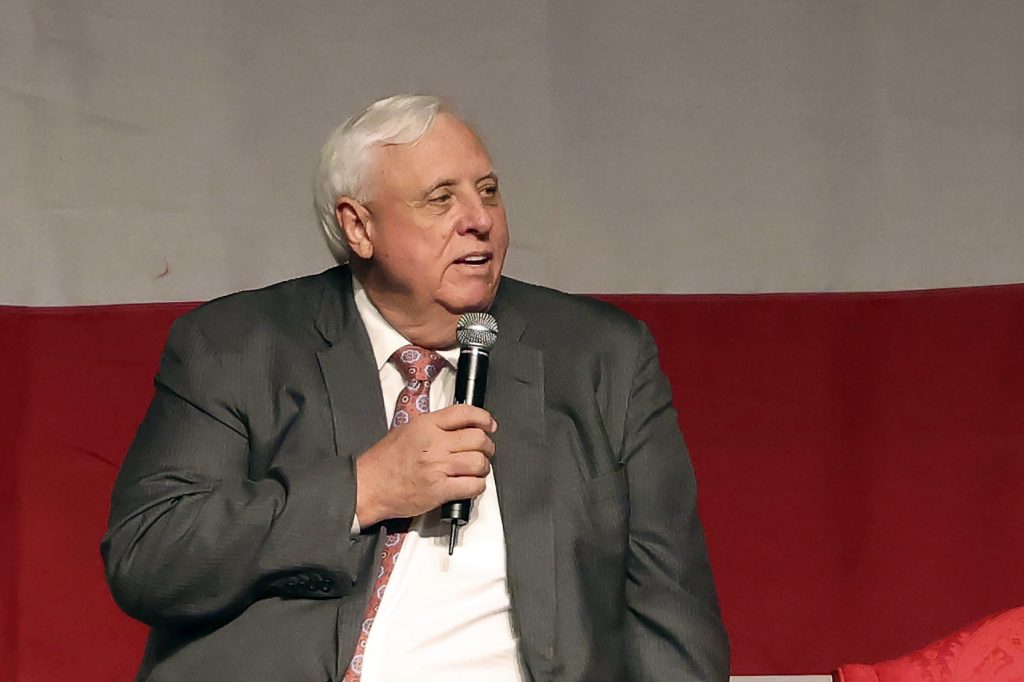Gov. Jim Justice is shown announcing his campaign for U.S. Senate in April. His business empire is facing legal attacks from all sides. | Chris Jackson/AP Photo
Republican Gov. Jim Justice was once identified as the only billionaire in West Virginia, but the business empire he built on coal has shrunk to a small number of companies beset by lawsuits and struggling to pay their bills.
A flurry of court filings in cases against Justice and his family indicates that his sprawling enterprises are short on cash, with his own lawyers calling them “disorganized.”
The court documents show that Justice is facing a series of extraordinary actions for a sitting governor — including the potential garnishment of part of his $150,000 state salary to repay loans for coal equipment, the Charleston Gazette-Mail reported earlier this year. Another plaintiff has asked U.S. marshals to seize millions of dollars from his accounts.
The legal storm is colliding with Justice’s campaign to unseat Democratic Sen. Joe Manchin in next year’s election, and offers a test for the popular governor whose fossil fuel wealth defined his political rise in coal country.
The latest legal challenge came Wednesday when the Justice Department sued Justice’s business enterprise and his son, James C. Justice III, over $7.6 million in unpaid penalties and fees for federal mine and safety violations as well as mine land reclamation costs.
“Our environmental laws serve to protect communities against adverse effects of industrial activities including surface coal mining operations,” Assistant Attorney General Todd Kim said in a statement. “Through this suit, the Justice Department seeks to deliver accountability for defendants’ repeated violations of the law and to recover the penalties they owe as a result of those violations.”
Justices’ campaign manager, Roman Stauffer, asserted that the lawsuit is politically motivated.
“Joe Biden, Chuck Schumer, and the Democrats have seen the polls that show Jim Justice winning this race, and they’re panicking,” he said in a statement. “So now the Biden Justice Department has decided to play politics.”
The department did not respond to a request for comment.
The lawsuit, which targets 13 Justice family coal companies that it said regulators had ordered to stop mining activities more than 50 times, adds another legal hazard to a long list of challenges facing Justice and his family businesses.
In April, lawyers for his family businesses indicated in court documents that his empire is short on cash. The case was brought by Fivemile Energy Co., which is suing the Justice businesses on behalf of New London Tobacco Market over a mining contract dispute. The case stretches back years and is still moving through the courts.
As a defense in that case, Justice’s company lawyers referred to his family businesses as a “somewhat disorganized organization whose resources are stretched to the limit with respect to both finances and personnel.”
Justice’s Republican and Democratic opponents have indicated they’ll go after his personal financial challenges in the Senate campaign.
Rep. Alex Mooney
, a conservative firebrand running against Justice in the GOP primary, tweeted last week, “My RINO opponent @JimJusticeWV will bankrupt America just like his businesses and the workers he wouldn’t pay.”
Meanwhile, the Democratic Senatorial Campaign Committee sued Justice last week for Justice’s schedules as governor. Previously schedules obtained by The Associated Press have indicated that Justice has spent little time at his office in the state Capitol and devoted significant time to his private businesses. (Justice’s office maintained to the AP that his calendars do not accurately reflect his activities.)
“Since entering the U.S. Senate primary, Jim Justice’s financial scandals have come under increased scrutiny,” DSCC spokesperson Amanda Sherman Baity said last week. “With court cases piling up, Alex Mooney is attacking Justice over his numerous debts and financial failures in Republicans’ Battle Royale Senate primary.”
The National Republican Senatorial Committee, which has not endorsed a candidate in the West Virginia primary, shot back that Biden’s administration has gone “totally rogue.”
“Democrats weaponizing the federal government to attack the family of a Republican Senate candidate is a complete abuse of power,” NRSC spokesperson Tate Mitchell said in a statement.
‘Decade of economic disaster’
Justice largely made his fortune in coal. His state financial disclosures show that his family owns more than 100 businesses. They include dozens of coal-related businesses as well as the 6,500-acre Greenbrier luxury resort in West Virginia.
But the boom times for coal are fading, and Justice’s company lawyers admit his empire is suffering as a result.
The family is exploring the sale of its primary coal-related business, Bluestone Resources, to settle more than $850 million in debt from personally backed loans, The Wall Street Journal reported in March.
Citizens Bank of West Virginia took legal action to reclaim $850,000 in debt, raising the possibility that a portion of Justice’s salary as governor may be garnished. The bank contends that Bluestone Resources defaulted on a loan used to purchase coal equipment. Justice has called that effort a “political grandstand.”
In a second case, Pennsylvania-based Xcoal Energy Resources asked a federal judge in West Virginia last month to have U.S. marshals seize $1.8 million from Justice personally, court documents show.
In that case, a judge determined that Justice family companies did not deliver more than 70,000 tons of coal owed to Xcoal. Two of Justice’s companies —– Southern Coal Corp. and Bluestone Energy Sales Corp. —– paid $5 million as part of a judgment in the case, but owe the remaining amount that Xcoal is trying to recover through the marshals.
In a third case, Carter Bank & Trust in West Virginia is trying to collect $300 million in debt from Justice’s family businesses related to loans that were due in April. James Justice, the governor’s son, accused the bank of “predatory behavior” in a statement and noted that the family companies had proposed a plan to repay $250 million immediately, followed by $57 million four months later. He said the bank rejected that plan because it didn’t want to lose $20 million in annual interest payments from the loan.
“The Justice family will demonstrate that the bank’s new court filing is nothing more than an illegal attempt to stop us from working with other lenders,” James Justice said. “It is unimaginable that a bank would deny a customer the ability to pay off a loan.”
In a fourth case, Kentucky-based Fivemile Energy Co. is seeking an $18 million judgment against Justice’s companies as part of a years-long dispute over a mining contract, reported MetroNews, an online and radio-based West Virginia news outlet. Lawyers for Fivemile asked a judge for an expedited decision in the case, citing the possible sale of Justice’s coal companies as well as their ability to pay Carter Bank & Trust $250 million for past due loans.
In court documents for the Fivemile case, lawyers for the Justice companies portrayed the businesses as struggling to pay their bills.
Some company accounts begin each month with just $1,000, the lawyers wrote. Then millions of dollars are transferred into them to cover expenses, followed by the accounts’ balance plummeting to almost zero, court records show.
“The cash that comes in is almost immediately transferred from those entities that have it to those that need it,” lawyers for the Justice family businesses said in court papers.
The 100-plus companies listed on Justice’s state financial statement vastly overstates the number that are actually in business, family lawyers said in a recent court filing.
The lawyers argued in the Fivemile case that “barely a dozen of the hundred-odd Justice coal and farming companies have continued to actively operate; that the companies are only beginning to emerge from a decade of economic disaster; that operating cash is chronically scarce and transferred among companies on a just-in time basis … It is apparent from the testimony that Defendants are legitimately without assets to pay the default judgments entered against them.”
It’s unclear if Justice’s financial woes will cost him any meaningful political support. A poll of registered voters released Tuesday shows that Justice is up 54 percentage points to Manchin’s 32 points. In the Republican primary, Justice is leading Mooney 53 to 12 percentage points, according to the poll from East Carolina University.
Justice has survived political attacks citing his legal challenges for years.
He has won four races – two primaries and two general elections – against opponents who targeted his finances, noted Mark Blankenship, a Republican pollster in West Virginia who worked for Justice’s 2020 gubernatorial campaign.
They spent millions of dollars airing ads over his court troubles, but Justice’s popularity has only grown.
“He’s expanded his margins,” Blankenship said, adding that “a lot of voters in West Virginia are aware of similarly positioned lawsuits against President [Donald] Trump, and his popularity is through the roof.”.
“So there may be an expectation there that if you are successful at a certain level at business or whatnot, there may be a built-in expectation that there are lawsuits.” he added.
A version of this report first ran in E&E News’ Climatewire. Get access to more comprehensive and in-depth reporting on the energy transition, natural resources, climate change and more in E&E News.








